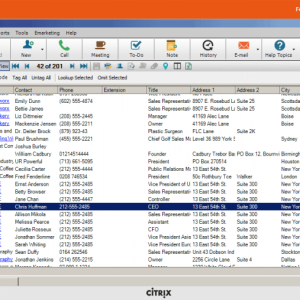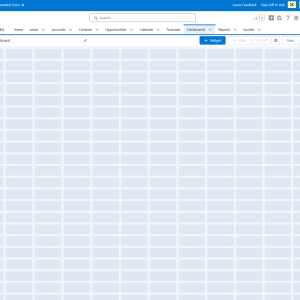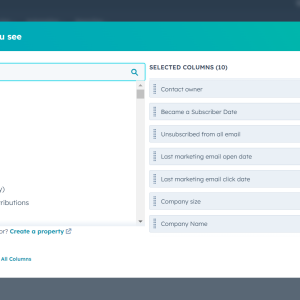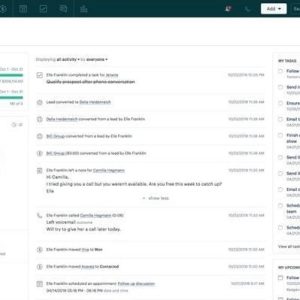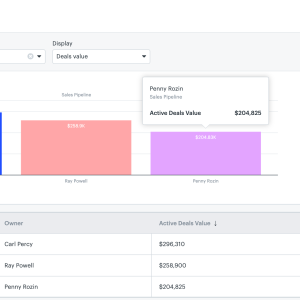In today’s fast-paced business world, customer relationship management (CRM) platforms have become essential tools for organizations to effectively manage and nurture their customer relationships. Two of the leading players in the CRM market are Salesforce and Microsoft Dynamics. These platforms offer a wide range of features and capabilities to help businesses streamline their sales, marketing, and customer service processes. As we look ahead to 2023, it is important to compare and evaluate these CRM platforms to determine which one is the best fit for your organization’s needs. In this article, we will delve into the key differences and similarities between Salesforce and Microsoft Dynamics, highlighting their strengths and weaknesses to help you make an informed decision.
Salesforce is better than Microsoft Dynamics, thanks to its abundance of features, robust team infrastructure functionality, and better customer support. In fact, Microsoft Dynamics is only better on pricing, and it’s not by much, with both options representing some of the most expensive CRMs on the market.
You are viewing: Salesforce vs Microsoft Dynamics – CRM Platforms Compared 2023
That said, both CRMs are respectable choices, particularly for larger businesses. When it comes to customer relationship management (CRM) software, there are many services out there, but these two providers are giants among the rest.
Salesforce is certainly the popular CRM software option, used by thousands of businesses worldwide, thanks largely to its massive features catalog. Microsoft Dynamics, meanwhile, is a great choice for those whose businesses are already integrated with other Microsoft services, such as Outlook and Office.
For a thorough look at the benefits and features of Salesforce and Microsoft Dynamics CRM, take a look at our head-to-head comparison table, below:
A good way to discover a CRM that can be customized for your needs is to use our handy CRM Quotes Tool to receive tailor-made, zero-obligation CRM cost quotes that take into account your company’s individual needs and scale.
Microsoft Dynamics vs Salesforce: Head-to-Head
Before we dig into the nitty gritty details of the Salesforce vs Microsoft Dynamics matchup, let’s take a quick look at some basic differences between the two platforms.
- Salesforce has more features than Microsoft Dynamics.
- Microsoft Dynamics is more affordable than Salesforce.
- Salesforce has better customer support than Microsoft Dynamics.
- Microsoft Dynamics integrates better with other Microsoft services than Salesforce.
- Salesforce has more team infrastructure features than Microsoft Dynamics.
- Microsoft Dynamics and Salesforce are both very customizable platforms.
As we mentioned above, Salesforce beats Microsoft Dynamics in all of the major categories of our research. Salesforce has more features, better customer support, more team infrastructure functionality, and overall better scalability for businesses that want to grow with the platform.
The only metric by which Microsoft Dynamics is better than Salesforce is price, and both CRMs are definitely on the more expensive side, netting two of the lowest scores across our research.
Likewise, Microsoft Dynamics and Salesforce both netted the same score for customizability, as both offer a wide range of integrations and robust analytics, allowing for users to utilize the platforms however they see fit.
Microsoft Dynamics still has its place, though, as it integrates seamlessly with the rest of the Microsoft 365 platform, like Outlook and Teams, so even if it has a bit less functionality, the ease of use is there if you already use those tools. Still, Salesforce clearly has the edge of everything else, which is why we recommend it so highly.
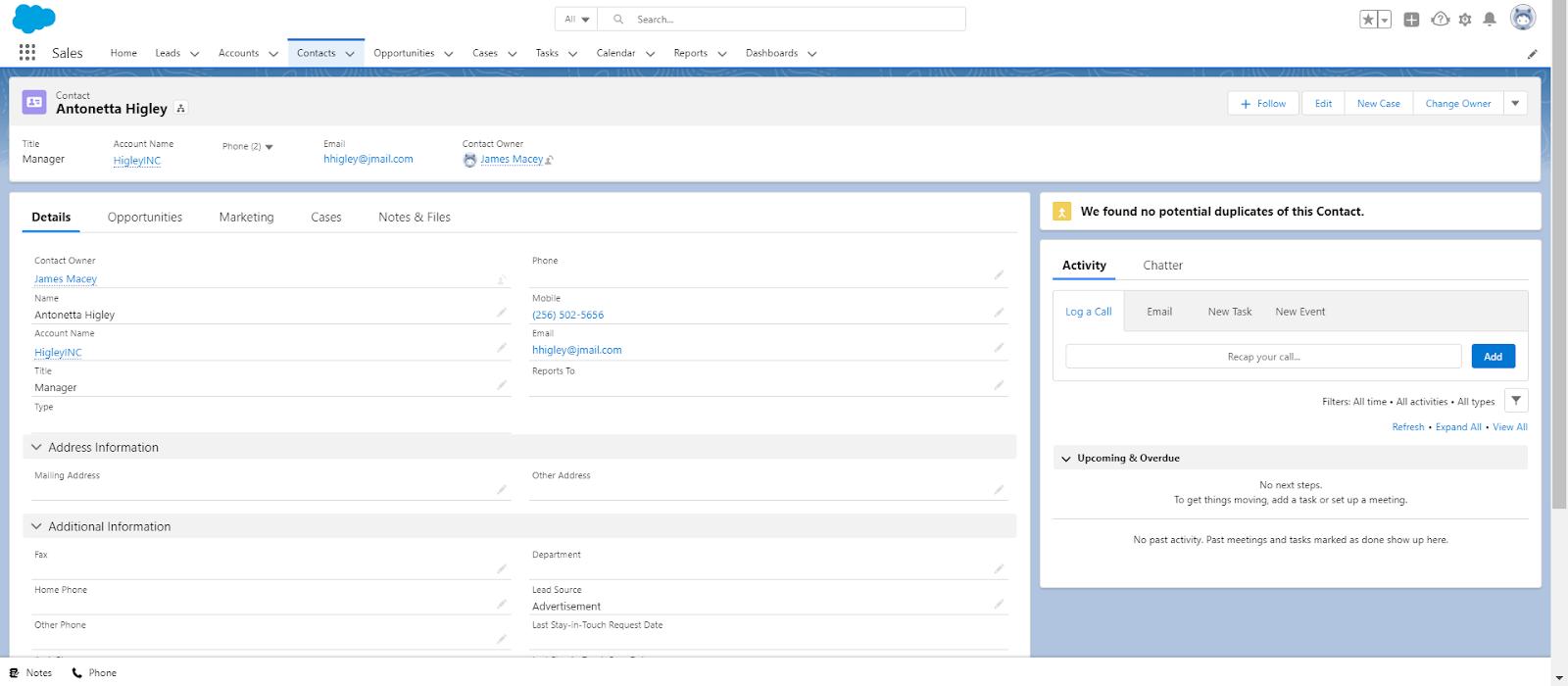
Salesforce contact database
Image: Duanetoops testing
Microsoft Dynamics Overview
The first thing to know about Microsoft Dynamics is that it is heavily integrated into other Microsoft applications. Microsoft’s integration doesn’t just extend to its desktop software, either.
Even LinkedIn, which Microsoft acquired in 2016, integrates with Dynamics CRM. The platform uses design language similar to other Microsoft software, making it easier for anyone who’s already familiar with the look and feel of modern Microsoft applications to feel right at home.
Most of the various Microsoft Dynamics services use a dashboard as their starting point similar to Salesforce. Here, you get at-a-glance information about the current state of your business. In Dynamics CRM for Sales, for example, the dashboard supplies current sales revenue, the average deal size, and your sales force’s lead conversion rate.
Dashboards are completely customizable and usually take the form of a tiled interface with large lettering for key numerical data, as well as large charts and graphs. Our researchers found the database functionaltiy to be extremely robust, tracking a lot of information, including in-depth timeline options that can show you everything you might need in chronological order.
Let’s take a look at three platforms offered by Microsoft Dynamics 365: Sales, Marketing, and Service.

Microsoft Dynamics 365 Sales
The primary starting point for many is Microsoft Dynamics 365 Sales. This core CRM app uses predictive analytics to better enhance the sales team’s snapshot data and help make better decisions. This is also where Microsoft’s LinkedIn integration comes into play; the LinkedIn Sales Navigator (available at higher pricing tiers) leverages your professional network to get introductions to potential leads through a mutual connection.
Beyond sales there’s a customer service module that can present key data such as open cases and email history as a dashboard or you can drill deeper with a timeline of interactions. Dynamics also uses a guided three-step process (identify-research-resolve) for dealing with customer services issues. Harnessing Microsoft’s server power, Dynamics offers intelligent chatbots that can help customer service agents surface important data about their customers.
The biggest gap for Microsoft Dynamics 365 Sales is that if offers zero lead capture features at all. Granted, Salesforce doesn’t offer much in comparison, providing on web form functionality for lead capture, but at least it’s something compared to complete lack of features from Microsoft.
Microsoft Dynamics 365 Marketing
See more : What Is a CRM Database? Business Tool Explained
When it comes to CRM for marketing, the range of products and prices is substantial. The Microsoft Dynamics 365 Marketing platform is one the higher end of that spectrum, offering robust automation functionality that can save your team a lot of time.
Still, in the realm of CRM for marketing, Microsoft Dynamics 365 Marketing can be a bit limited, largely because it can only be used for email. The platform offers no features for social, paid, or content marketing, which can be a bit limiting when it comes the scalability, you’d want with a CRM that’s this expensive.
Compared to Salesforce, Microsoft Dynamics does have a few notably missing features, like keyword monitoring and competitor analysis for content marketing. On top of that, Salesforce provides metric reports for paid marketing, which Microsoft Dynamics does not.
It does integrate excellently with other Microsoft products, though, and you’ll get top notch customer support, training, security, and onboarding, so it’s up to you!
Microsoft Dynamics 365 Service
Microsoft Dynamics 365 is probably the best option out of the three, offering a good option for the price. It only offers email support built in, but thanks to the myriad of Microsoft add-ons, you can integrate phone, website live chat, social media, and instant messaging app communications. They’ll cost a bit extra, but it could be worth it to have a more complete customer service process.
Even better, Microsoft Dynamics 365 Service comes with a bunch of team infrastructure features that can make managing your team that much easier. Pair with software like Outlook and Teams, you’ll be able to manage a remote team flawlessly.
It’s worth noting that most of these additional features are in the more expensive Enterprise plan, but the overall pricing of Microsoft Dynamics 365 Marketing is at least competitive in the market, unlike the previously mentioned CRMs.
The problem is that Microsoft Dynamics 365 Service has a lot of its features behind paywalls, requiring add-ons that cost more to get added functionality. In fact, with any channel other than email, you’ll be paying extra, including social and chatbot ticketing, both of which are included with Salesforce.
Salesforce Overview
Widely known as one of the best CRM systems around, Salesforce has much cause for confidence. The company insists, for example, that Salesforce can outdo its main competitors. In truth, the functions of Salesforce and Microsoft Dynamics are broadly similar.
The similarities are quite apparent when it comes to the kind of data you can track. Both Dynamics and Salesforce have robust dashboard and analytic options, with our researchers finding that Salesforce offers in-depth chart and visualization builders that can link up different data points, generating powerful insights for your team.
Where Dynamics has its modules, Salesforce has its various “clouds,” such as Sales Cloud and Service Cloud. These two form the major components of its CRM solution. There’s also Salesforce Marketing Cloud, the company’s marketing platform, which is a great option for streamlining your process for reaching and retaining customers.

Salesforce home dashboard
Image: Duanetoops testing
Salesforce Sales Cloud
Sales Cloud offers all the essential features you need for CRM, such as managing opportunities, leads, contacts, accounts, and email integration (Gmail and Outlook). Alternatively, users can access Salesforce data from within Gmail. This is similar to Microsoft’s Relationship with Sales feature we discussed earlier.
Both Salesforce Sales Cloud and Microsoft Dynamics 365 Sales offer lead scoring functionality. However, Salesforce Sales Cloud includes it as part of the platform for all plans except the Essentials plan, while Microsoft Dynamics 365 Sales requires an add-on that costs extra.
Salesforce Service Cloud
Service Cloud also offers a number of essential features such as the ability to chat with customers across multiple platforms including IM, social media, and SMS. There’s also an integrated field service option and the ability to see all communication with particular customers.
Most notably, Salesforce Service Cloud allows for the creation of a user forum, where customers can help each other solve problems with the platform, a feature that is not available with Microsoft Dynamics 365 Service, no matter how much you pay.
Salesforce Marketing Cloud
Salesforce and Microsoft Dynamics 365 offer similar options when it comes to their marketing automation platforms and the price reflects that. You’ll be able to automate your marketing efforts to make a bigger impact on your potential customers. The primary focus for both is email, but Salesforce also offers limited features for social, content, and paid, while Microsoft Dynamics 365 Marketing does not.
Salesforce is a bit expensive, though, particularly when you consider the limited features it offers compared to others in the industry. Even worse, it doesn’t offer great help and support, which can be vital to the success of a good CRM.
Microsoft Dynamics Pricing vs Salesforce Pricing
While business software pricing is typically pretty cut and dry, Microsoft Dynamics and Salesforce represent, arguably, two of the most thorough and confusing pricing systems you can find. They both offer a seemingly endless array of add-ons, optional packages, and core functionalities that can make the process a bit intimidating.
In hopes of making it a bit less daunting, we’ve covered each providers pricing plans and options to give you a better idea of what you’re signing up for and how much it’s going to cost you.
Microsoft Dynamics Pricing
Microsoft offers its CRM platform under the Dynamics 365 app, which caters to a wide range of business types. As such, pricing for the platform depends on what kind of business area your company falls under.
See more : Salesforce Lightning vs Classic Compared
Below, we’ll breakdown the pricing for Microsoft Dynamics 365 Sales, Microsoft Dynamics 365 Marketing, and Microsoft Dynamics 365 Service.
Microsoft Dynamics 365 Sales
The Microsoft Dynamics 365 Sales platforms offers the most plans in the bunch, with a total of four. The prices start a bit high compared to Salesforce, but have a smaller range, topping out at barely more than half of Salesforce’s most expensive plan.
Here’s a breakdown of the four pricing plans for Microsoft Dynamics 365 Sales:
Microsoft Dynamics 365 Service
With only two plans, the Microsoft Dynamics 365 Service platform might seem a bit limited. But as long as you’re a bigger company in need of some robust features, these are competitively priced. Still, it’s worth considering the expense you could incur if you need additional channels other than email, as they will cost you extra.
Here’s a breakdown of the two pricing plans for Microsoft Dynamics 365 Service:
Microsoft Dynamics 365 Marketing
No need for a table on this one! Microsoft Dynamics 365 Marketing only offers one pricing plan — compared to Salesforce Marketing Cloud’s four — which costs $1,500 per month, allows for unlimited users, and has a contact limit of 10,000 contacts. It can notably only help with email marketing, which can be a deal breaker, especially for the price. Still, if you’re already set up with Microsoft, it can be a valuable addition to the business.
Salesforce Pricing
Salesforce is definitely a more affordable option than Microsoft Dynamics, although it’s only slightly less complex as far as how it works. Check out the table below to see how much each Cloud will cost and keep scrolling for a more in-depth look at pricing plans for each option.
Check out our Salesforce pricing guide for more information
Salesforce Sales & Service Cloud Pricing
The most common options for CRM are the Sales Cloud and Service Cloud, which give you all the CRM functionality you need for your sales or customer service business.
Each platform offers four different pricing plans, which conveniently line up in price and functionality: Essentials, Professional, Enterprise, and Unlimited.
Sales and Service can also be bought as a bundle, with the Essentials plan still costing just $25 per user per month, but different pricing for the remaining plans: The Professional plan for a Sales/Service bundle costs $105 per user per month, the Enterprise plan costs $190 per month, and the Unlimited plan costs $355 per user per month.
Salesforce Marketing Cloud Pricing
In addition to the Sales Cloud and Service Cloud options, Salesforce Marketing is a popular option for those in those looking for a CRM for marketing. It offers a robust platform that can help you automate a wide range of processes to save your business time. It is a bit expensive, especially considering its limited features in some areas, but it could still be the right fit for your company.
Here’s how the pricing breaks down for the different Salesforce Marketing Cloud plans:
Other CRM Alternatives
Yes, Salesforce and HubSpot are two of the best CRM platforms on the market today. Still, they’re very much geared towards larger businesses, which means that small businesses might be looking for an alternative that fits their needs.
Fortunately, we’ve done a lot of research on the best CRMs for small business, so you can find the right platform for your business. Take a look at the table below to see what kind of options are available today.
About Our Research
There’s more to Duanetoops’s business software guides that you might realize. While other sites just throw providers on a list and call it a day, our research team spends hours cultivating an in-depth array of valuable research insight to make sure our readers get the most helpful information.
The only way to make a truly informed decision is with this kind of research, which is why we’ve focused so much energy on bringing these CRM software providers into the light. We evaluate everything — including features, pricing, customization, help & support, and team infrastructure — so you don’t have to do all the digging yourself.
For more information about our in-depth process, take a look at our research guide to see exactly how we rate and rank these business software providers.
Check out our Best CRM for Small Business guide for more information
That’s a wrap on “ Salesforce vs Microsoft Dynamics – CRM Platforms Compared 2023 ” We hope you’ve found a trove of useful insights and fresh perspectives. Your opinions and ideas matter to us—join the conversation below and share your take! Hungry for more tech insights? Dive into our diverse collection of articles where innovation meets practicality. Discover More CRM Softwares.
Stay in the loop with the latest in AI and tech – your journey into the digital future continues at duanetoops.com.
#Salesforce #Microsoft #Dynamics #CRM #Platforms #Compared
Source: https://duanetoops.com
Category: CRM
